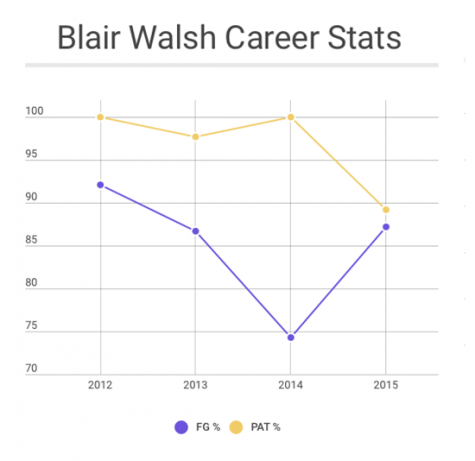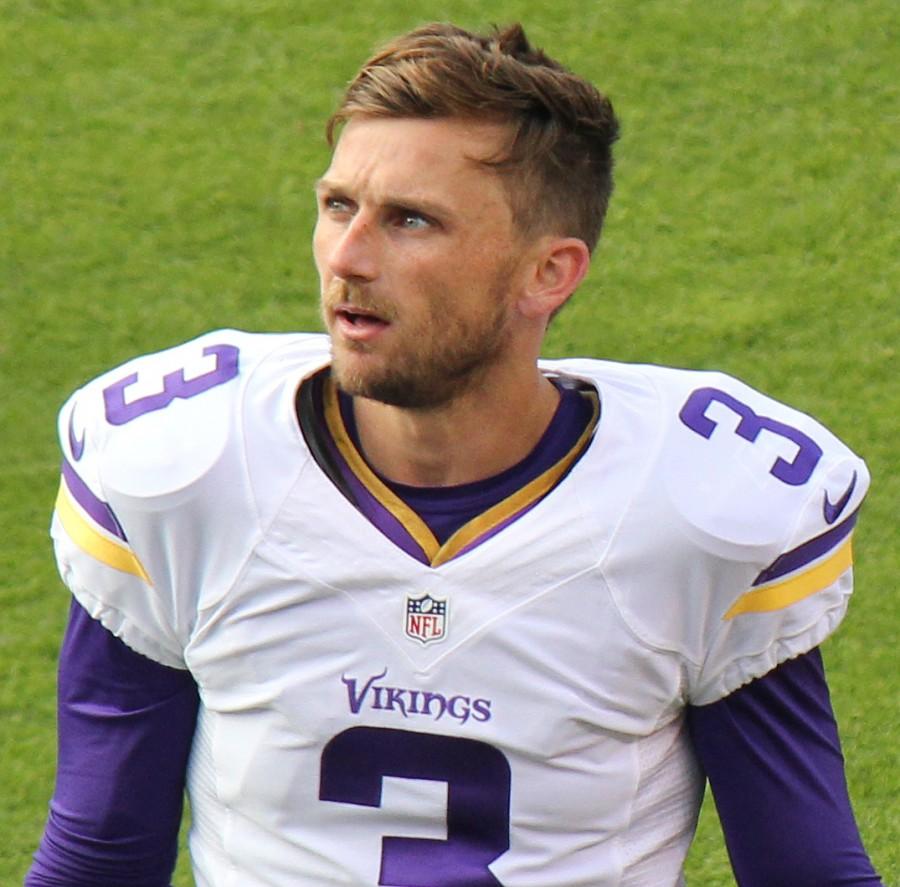Beyond the Game: Response to Vikings’ kicker debacle highlights social media flaws
Wikimedia Commons
Minnesota Vikings’ placekicker Blair Walsh as he waits on the sideline. Walsh, whose missed game-winning field goal in the National Football Conference Wild Card game against the Seattle Seahawks sparked millions of hostile social media posts, felt the brunt of the blame, even though the rest of his team was even more responsible for the loss.
January 21, 2016
Imagine you’re a placekicker for an NFL team, you have played only seven times in a 60+ minute game, and the fate of your team’s entire season relies on you converting a go-ahead field goal (in the third coldest game in league history). Minnesota Vikings kicker Blair Walsh faced that exact situation.
With 25 seconds left in the National Football Conference Wild Card game against the former NFC champion Seattle Seahawks, Walsh missed a chip shot 27-yard field goal, crushing the Vikings’ hopes of reaching the Super Bowl. To nobody’s surprise, “fans” immediately took to social media, dishing out death threats, mocking the “simplicity” of his job and blaming the special teams player for the demise of the season.
But, let’s keep a few facts in mind: Walsh scored all of the Vikings’ points that game, scoring on each of his three field goal attempts. He made the most field goals out of all placekickers in the 2015-2016 regular season. And he finished with an 87% completion percentage, ranking 14th out of all kickers. Yet, when the time comes to point fingers, many point at Blair Walsh. Expected but not warranted.

Social media provides everyone with a unique platform for free, unfiltered expression, often at the expense of respect. Admittedly, for example, it’s convenient for a person to tweet “Blair Walsh is the worst kicker I’ve ever seen… smh #choke” in the safety of his house two thousand miles away from the game.
This ease of typing, clicking, and posting sometimes allows people to bypass or neglect a key stage of reflection: “I wouldn’t say that to him in person, but I’m posting it on social media, so it’s okay.” Sure, a clear barrier exists between the online critic and the subject of the criticism, but the vitriol of the words nonetheless makes an impact.
Let’s say Walsh missed the field goal in the first quarter and later went on to score his nine points. Let’s say Minnesota Vikings running back Adrian Peterson fumbled the football (which led to a scoring Seattle Seahawks drive) after Walsh missed the field goal. Would people criticize Walsh as harshly as they did before? What if the Vikings played better defense? What if the weather was better? These hypotheticals and variables suggest that the blame of a significant loss cannot fall on one person’s shoulders. The beauty, or blemish, of competitive team sports is that, win or lose, all individuals – coaches, players, trainers – play a role in the outcome of a season.
After all is said and done, when people toss enough insults into the cloud of social media, these remarks eventually fall upon an actual person. Blair Walsh made a mistake. It’s time to move on.





![LALC Vice President of External Affairs Raeanne Li (11) explains the International Phonetic Alphabet to attendees. "We decided to have more fun topics this year instead of just talking about the same things every year so our older members can also [enjoy],” Raeanne said.](https://harkeraquila.com/wp-content/uploads/2025/10/DSC_4627-1200x795.jpg)


















![“[Building nerf blasters] became this outlet of creativity for me that hasn't been matched by anything else. The process [of] making a build complete to your desire is such a painstakingly difficult process, but I've had to learn from [the skills needed from] soldering to proper painting. There's so many different options for everything, if you think about it, it exists. The best part is [that] if it doesn't exist, you can build it yourself," Ishaan Parate said.](https://harkeraquila.com/wp-content/uploads/2022/08/DSC_8149-900x604.jpg)




![“When I came into high school, I was ready to be a follower. But DECA was a game changer for me. It helped me overcome my fear of public speaking, and it's played such a major role in who I've become today. To be able to successfully lead a chapter of 150 students, an officer team and be one of the upperclassmen I once really admired is something I'm [really] proud of,” Anvitha Tummala ('21) said.](https://harkeraquila.com/wp-content/uploads/2021/07/Screen-Shot-2021-07-25-at-9.50.05-AM-900x594.png)







![“I think getting up in the morning and having a sense of purpose [is exciting]. I think without a certain amount of drive, life is kind of obsolete and mundane, and I think having that every single day is what makes each day unique and kind of makes life exciting,” Neymika Jain (12) said.](https://harkeraquila.com/wp-content/uploads/2017/06/Screen-Shot-2017-06-03-at-4.54.16-PM.png)








![“My slogan is ‘slow feet, don’t eat, and I’m hungry.’ You need to run fast to get where you are–you aren't going to get those championships if you aren't fast,” Angel Cervantes (12) said. “I want to do well in school on my tests and in track and win championships for my team. I live by that, [and] I can do that anywhere: in the classroom or on the field.”](https://harkeraquila.com/wp-content/uploads/2018/06/DSC5146-900x601.jpg)
![“[Volleyball has] taught me how to fall correctly, and another thing it taught is that you don’t have to be the best at something to be good at it. If you just hit the ball in a smart way, then it still scores points and you’re good at it. You could be a background player and still make a much bigger impact on the team than you would think,” Anya Gert (’20) said.](https://harkeraquila.com/wp-content/uploads/2020/06/AnnaGert_JinTuan_HoHPhotoEdited-600x900.jpeg)

![“I'm not nearly there yet, but [my confidence has] definitely been getting better since I was pretty shy and timid coming into Harker my freshman year. I know that there's a lot of people that are really confident in what they do, and I really admire them. Everyone's so driven and that has really pushed me to kind of try to find my own place in high school and be more confident,” Alyssa Huang (’20) said.](https://harkeraquila.com/wp-content/uploads/2020/06/AlyssaHuang_EmilyChen_HoHPhoto-900x749.jpeg)










